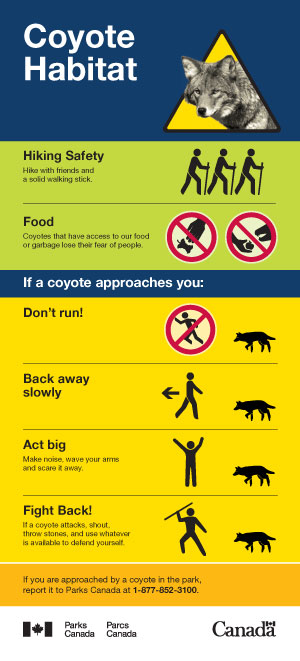
Visitor safety
Cape Breton Highlands National Park
We rarely head out for an outdoor adventure with the expectation that something will go wrong, and most times everything will go right. However, sometimes the unexpected happens and when it does, it's important that you are well-informed and well-prepared to minimize the negative impact of unfortunate circumstances.
For general information on how to stay safe and a list of the 10 essential items you should bring when enjoying the outdoors, visit www.adventuresmart.ca
For important information about staying safe while enjoying Cape Breton Highlands National Park, please explore the topics below:
General safety
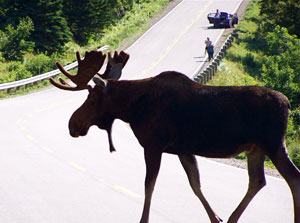
Be alert for moose crossing roads.
© D. Aucoin
- You are responsible for your own safety. Seek out information, follow signs and be prepared. Know your own abilities and equip yourself properly.
- Most accidents happen on the road. Follow the speed limit and slow down after dark, in heavy rain or high winds.
- Be alert for moose crossing roads. They can be very hard to see, especially at dusk or if they are not facing you. Be prepared to stop suddenly.
- While hiking, bring drinking water and dress appropriately. Weather may change rapidly, especially at higher elevations and along the coast.
- Caution: cell phone coverage is unreliable within the park. Public telephones can be found at the visitor centres and campground kiosks.
Wildlife safety
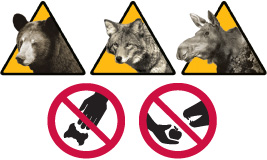
- This is the home of black bears, moose and coyotes.
More information on safety around these animals is available in our Keep It Wild, Keep It Safe section, also available for download (1.85 MB, PDF). - Feeding or enticing wildlife is unlawful. It puts you and the animals at risk.
- Put your food and garbage away. Bears and other animals may be attracted to your food.
- Littering can harm wildlife and is subject to a fine.
- Store food in your vehicle and use bear-proof garbage cans.
- Do not throw food or scraps along the trails and roads.
Coyotes and public safety
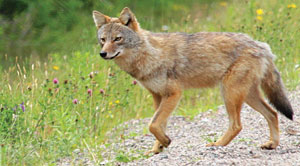
Eastern coyote
Parks Canada is working with experts in coyote behaviour and ecology, wildlife management, and human behaviour and education to develop and implement best practices for public safety in Cape Breton Highlands National Park. Visitors to any park or natural area should be aware of the risk of wildlife encounters, not just with coyotes.
There are a number of things that you can do to improve your personal safety. Download our Coyote Habitat brochure (185 KB, PDF) for more information.
General
- Do not feed coyotes and be sure to properly dispose of garbage and other food sources. Coyotes that have access to our food lose their fear of people.
- Ensure children are accompanied by an adult at all times.
- Learn to recognize hazardous behaviours and situations.
- Report incidents promptly to Parks Canada at 1-877-852-3100.
Hiking
- Hike with friends.
- Carry a solid walking stick.
- Tell someone where you are going.
Camping
- Sleep inside a tent.
- Store food in coolers inside vehicles when not at the campsite.
- Dispose of grey water properly.
If you see a coyote at a distance
- Stay back. Do not approach the animal.
- Watch it carefully to assess its behaviour.
- Look for other animals.
If the coyote approaches or is close by
- Maintain your distance. Do not turn your back. Do not flee.
- Back away slowly.
- Stay together.
- Act big. Make noise, wave your arms, and try to scare it away.
- Identify and maintain escape routes.
If a coyote attacks
- Fight back. Shout, throw stones, use whatever is available to defend yourself.
To learn more:
Hinterland Who's Who
Nova Scotia Department of Natural Resources: Be Coyote Smart
Ontario Ministry of Natural Resources
Rip currents and rogue waves

- Winds and tides create strong undertows at all ocean beaches. Swim close to shore and stay out of the water when waves are high. High winds create dangerous rip currents at all beaches on the Atlantic Ocean. These rip currents can persist for several days after a storm and can pull you under and out to sea.
- If caught in a current, do not fight it. Calmly swim parallel to the shore until you are out of the current. If you cannot escape, float or tread water, wave and call for assistance.
Click to view an illustration which describes the method of escape from a rip current. - Unexpected large rogue waves can sweep you off low, rocky shorelines during high winds and for several days afterwards.
Reminders
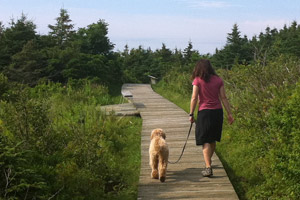
Pets must be kept on a leash at all times.
- Recycling facilities are available throughout the park.
- Leave nature in its place. It is illegal to collect or disturb plants, animals and rocks, or to gather firewood or kindling.
- Don't move firewood.
- Stay on trails to reduce damage to soil and plants.
- Pets must be kept on a leash. Please pick up their droppings.
- No pets allowed on the Skyline trail and in certain beach areas. Please comply with signage.
- Alcohol is not permitted in public areas (beaches, picnic areas, trails, etc).
- Alcohol is allowed on registered campsites only, subject to Provincial and National Park Regulations.
- Fires are allowed only in park fireplaces – do not leave unattended.
Downloads
Keep It Wild, Keep It Safe brochure (1.85 MB, PDF)
Coyote habitat brochure (185 KB, PDF)
Safety is everyone's responsibility. At Parks Canada, we do our part to make sure you can have a safe visit by assessing the risks, managing hazards, and making sure that safety information is freely available to everyone. You can do your part as visitors by making sure you seek out the information you need to stay safe and make well-informed decisions while enjoying these special places. Visit our websites and stop at a visitor centre to speak with our employees for the most up-to-date information. Make sure you are fully prepared for whatever activities you choose to participate in so you can have a safe, enjoyable and memorable visit.
In case of a park emergency call 1-877-852-3100
- Date modified :
